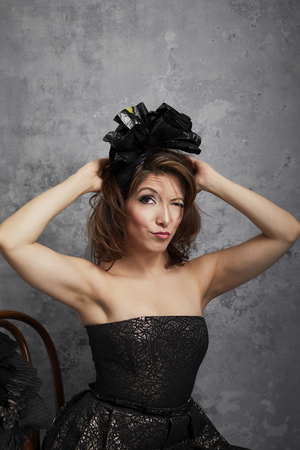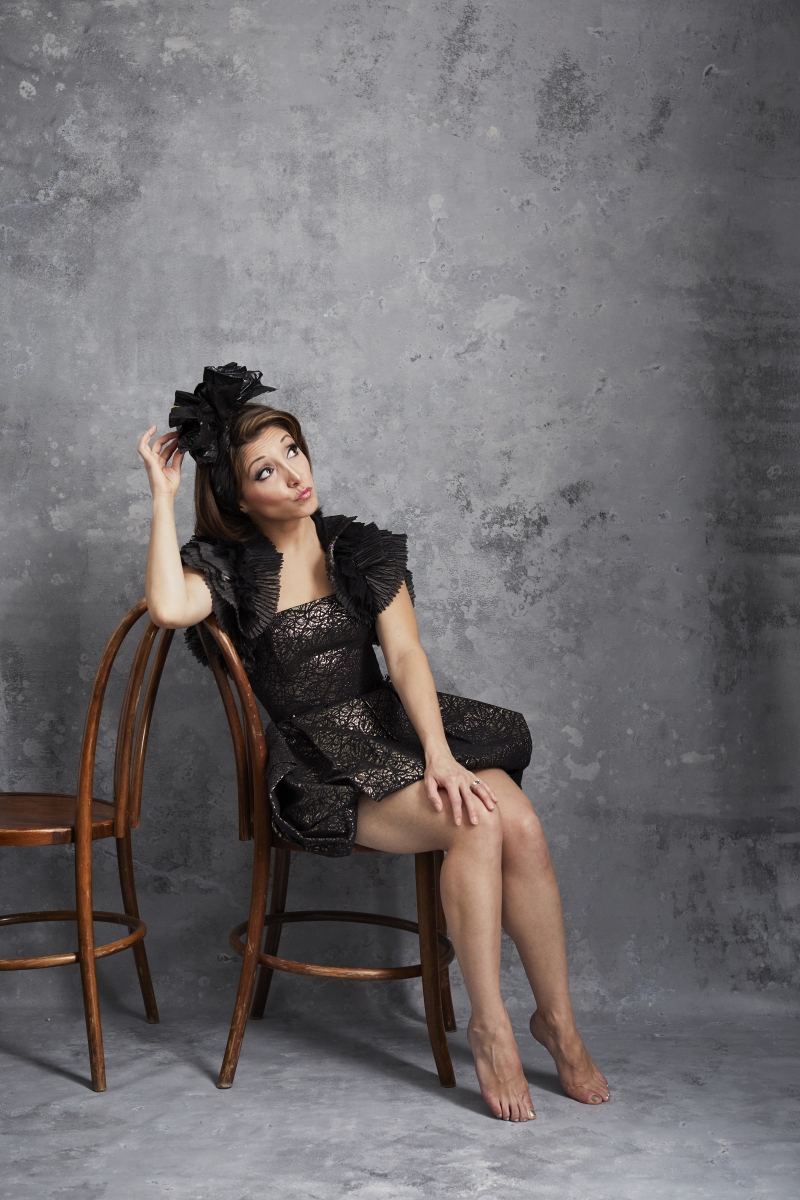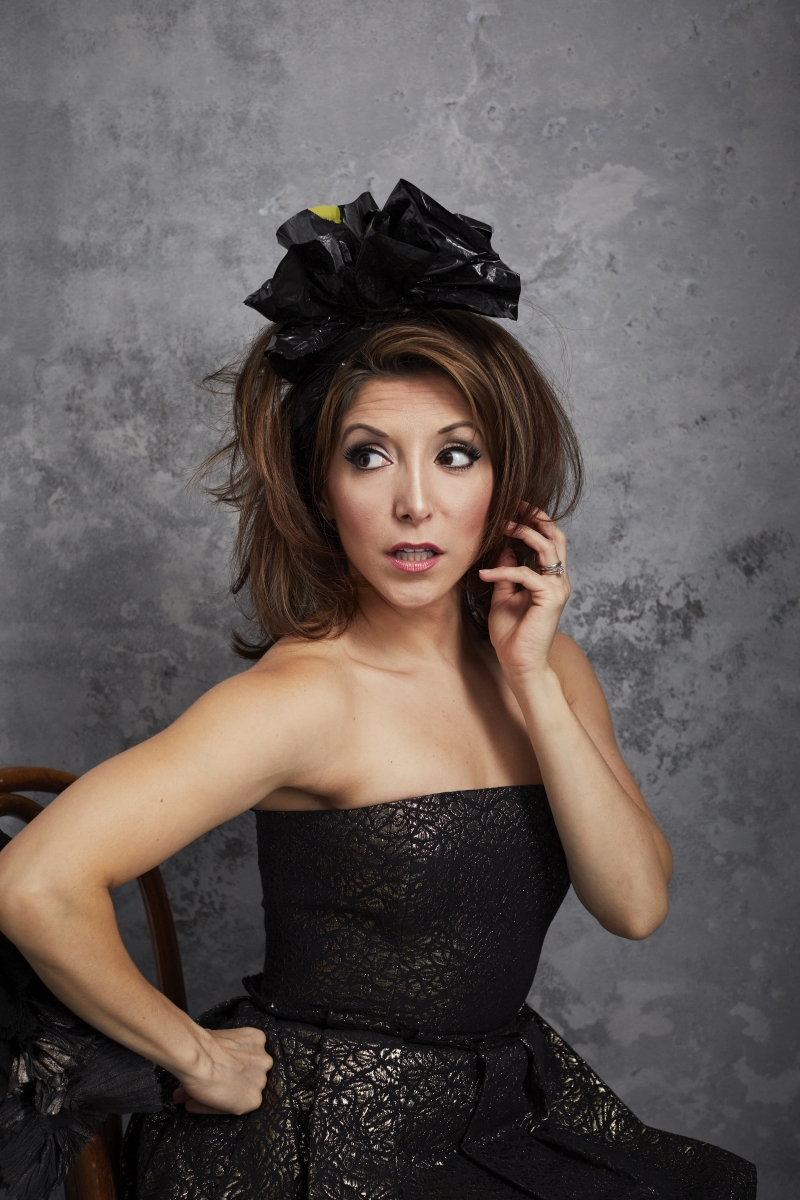Interview: 'To Be Able to Perform One Show That Encapsulates Both Parts of Me is Very Important': Christina Bianco on IN DIVINE COMPANY at Menier Chocolate Factory
In Divine Company will be running at the Menier Chocolate Factory from 11 to 20 May.

BroadwayWorld UK recently spoke with Christina Bianco, whose solo show, In Divine Company, will be running at the Menier Chocolate Factory next month.
We discussed the creative process of creating show, the differences between performing as others and herself, and why this show will be great for audiences of all ages.
What inspired you to create In Divine Company?
Well, to be perfectly honest, a phone call from David Babani [Artistic Director of Menier Chocolate Factory]! [Laughs]
I always have lots of ideas for what I'd like to do - not particularly an entire new show, but you get an idea with something that's happening in the news, like say Eurovision. Everyone kept saying "You should do something for Eurovision!" So I was thinking of that. And then also with my recent work in The Wizard of Oz, there's some Wizard of Oz-ish material that I was contemplating working on. So when David asked me if I'd be willing to put a show together, it was great, because there were a few things I knew I really wanted to include, and then also pushes me to think of some things I'd never attempted before.
And also to, of course, go back and take some of what I call my "evergreen material" that I haven't performed in London for years and I think would be really good for this particular audience. Because the special thing about doing a show at the Menier is that not only do I hope that some people that know me already will come, but I know it's gonna be a new audience. And so it's tricky because you can't just dive in with a million crazy niche impressions or musical theatre references when you don't know exactly who the audience is. So part of my putting the show together is quite personal and artsy. And the rest of it, like anything, you have to approach it from a business standpoint in understanding how producing theater at a beautiful venue like the Menier works.
What has the creative process of creating a show like In Divine Company been?
There are so many things at play, because I always want to include the songs from theatre, jazz, standards and pop that make me happy and excite me, as well as the impressions. So the first thing is finding the balance of Christina with the voices. I love doing impressions, I will never stop doing them, but they're not the only thing that I do. So that balance is is very important.
I know that if I did a show that was only Christina as Christina, that would appeal to a certain group of audience, but not everybody, and the same can be said if I did just impressions. So it's finding that delicate balance, particularly in a show that has two sets - that's very special. And then within that you want to do some bits that are quite comedic and quite exaggerated and broad with impressions. And then some perhaps that are more about my being vocally accurate. So let's say Edith Piaf singing an ABBA song, that's going to be ridiculous and extreme. But me singing a little bit of "Diamonds are Forever" as Shirley Bassey, I want that to be as accurate as precise as possible. So it's finding those those balances of what I think is entertaining, what I think the audience will find entertaining, and what makes a well rounded show.
How do you develop all of your impressions?
I'm crazy!
[Laughs]
 I make faces and do funny voices until I find the right combination sometimes. It's really trial and error. Some impressions come really easily to me - their voices aren't very different or to my own. Some are quite difficult, so they require a lot more work. But they always say that practice makes perfect. And the more flexible you are with your voice, the easier things get.
I make faces and do funny voices until I find the right combination sometimes. It's really trial and error. Some impressions come really easily to me - their voices aren't very different or to my own. Some are quite difficult, so they require a lot more work. But they always say that practice makes perfect. And the more flexible you are with your voice, the easier things get.
So there are certain impressions I couldn't do years ago that now I find a bit easier. It's a constant learning process. I'm working a lot more as Christina, the singer and actor, in my own right - I have fewer new impressions than I probably should! But sometimes you have to take the work as it comes. And so this has given me a few opportunities to try a couple of new impressions. And we'll find out together if I'm successful!
What is it about impressions that you think makes them so popular?
It's a very lovely thing when someone does an impression in a room, whether it's at school, at work or at a party. "Oh! Listen to so-and-so, they're doing an impression of, XYZ!" And everyone gets excited. I think the word is familiarity. If I say, "Here's an impression of my mother," it doesn't appeal to you as much because you don't know who my mother is. So it's a common factor - there's something that we all have in common. We all know this celebrity, hopefully, we all like the celebrity - Impressions are much funnier if you like the person!
I think I'm much more successful if they come from a place of love and respect. And so if you are presenting them in a way that is truly celebratory and focusing on the talent of that artist, then it's this shared experience. Not only are you, as the impressionist, entertaining the audience, you're also sharing in a love of somebody else who you're mutually appreciating. That's why I think impressions are popular. Yes, there's that crazy thing of "Wow, I can't believe you sound like somebody else!" But that only takes you so far. And I think that's why most of the successful impressionists and performers are the ones that don't do more cruel or exaggerated material and do ones that really celebrate the artists.
What is it like returning to the same theatre where you made your West End debut?
It's really fabulous! When I was asked years ago to do Forbidden Broadway at the Menier Chocolate Factory, and then bring it to the Vaudeville, I was coming off of my very first run at the Edinburgh Fringe Festival - I had the "Fringe Flu!" I remember being sick in Edinburgh, learning this Forbidden Broadway material, just thinking, "I only got a few days before I'm there on that stage at the Menier Chocolate Factory and have to perform this for an audience!" And so I was so excited, but I was so very stressed.
I think the first thing is going to be a little bit of relief that I get to return having worked so much and so frequently within the UK, instead of it being this daunting feeling. It definitely is much more calm and it feels like coming home. I'm also very grateful because the Menier and David Babani were the first people to really give me my shot here in London on a theatrical stage, not just a concert one, and appreciate both sides of me.
I love doing impressions, and it's great to work as an impressionist. But now, I think most people that know my work know that I also do a lot of work as Christina, and it's really important for someone who's known for doing impressions to not lose sight of themselves and their own ability. To be able to perform one show that really encapsulates both parts of me is very important. And so I'm so grateful that they asked me to do that.
Have you noticed much difference between New York and London audiences when performing shows?
People ask me this all the time, and I always say, the only difference is that New York audiences tend to lean back. Not negative, but the attitude is more like, "Entertain me." Whereas I find a lot of British audiences tend to lean forward, as if they're coming in to be entertained. And so that's a physical thing, but it also translates to how the entire show is received. So I think the outcome is the same, but the the way that the material is received by the audience is different.
 A British audience tends to be a little more vocal. You would think that a loud New York audience might be more rowdy, but I don't find that - I actually find a British audience is a little more keen! Maybe it's panto culture, maybe there's something about a conversation with the actors on stage - that is something that never happens in the US that happens tends to happen a lot in various forms of British theatre. So I think that maybe that familiarity, that comfortable relationship between person onstage and audience member, is something that makes British audiences lean forward a little more. I can't say I like it better, but it is nice to have an audience come to you as opposed to having to work so hard to go to them. So I do I like like that very much about British audiences.
A British audience tends to be a little more vocal. You would think that a loud New York audience might be more rowdy, but I don't find that - I actually find a British audience is a little more keen! Maybe it's panto culture, maybe there's something about a conversation with the actors on stage - that is something that never happens in the US that happens tends to happen a lot in various forms of British theatre. So I think that maybe that familiarity, that comfortable relationship between person onstage and audience member, is something that makes British audiences lean forward a little more. I can't say I like it better, but it is nice to have an audience come to you as opposed to having to work so hard to go to them. So I do I like like that very much about British audiences.
What do you hope audiences take away from In Divine Company?
As cheesy as it sounds, there really is something for everybody. I love so many different types of music. I love musical theatre, pop music, jazz, rock, and swing, and I'm going to try to get all of it into the show! And I'm going to try to present it in ways that the kids, parents, and grandparents can understand and enjoy. From Ariana Grande and Billie Eilish to Britney Spears and Celine Dion, to Judy Garland, Liza Minnelli, Marilyn Monroe...all of these voices and characters will be in the show. I also want the audience to get to know me. The better they know me, the better they can understand how and why I'm celebrating all of these other great divas. So the show is really a celebration of music and these artists that have inspired all of us. If they come to the show, I hope they leave singing songs, having fond memories of performers that have impacted them over the years, and hopefully very entertained by this one petite crazy lady running around the stage! [Laughs]
And finally, how would you describe In Divine Company in one word?
Celebratory. It's not dramatic and it's not just silly. It's really a celebration. A lot of my titles have been variations on a theme because you want an audience to get that there's multiple voices or impressions. But this one, it's not a nightclub - It's a theatre. So it's definitely going to be more presentational. And with that, I don't want people to be too cold. So by calling it In Divine Company, it's the divas of the divine, it's Coronation Week - divinity, and it's the company of being together. So I'm trying to make it this inclusive celebratory event.
In Divine Company runs at the Menier Chocolate Factory from 11 - 20 May
Comments

Videos

